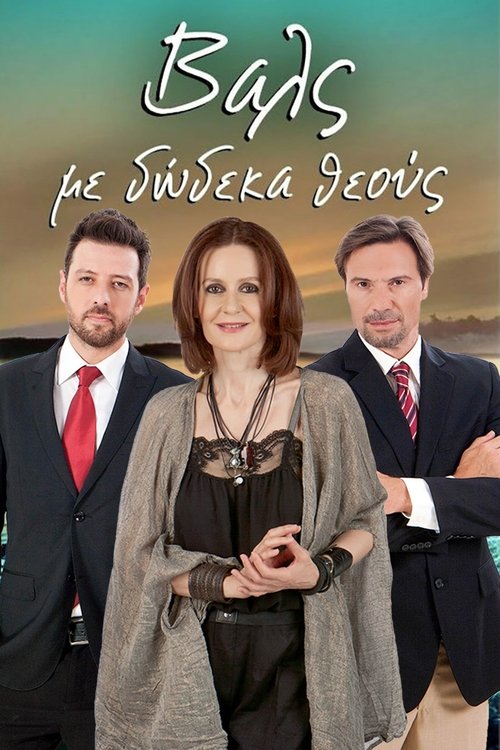
Ask Your Own Question
What is the plot?
In the beginning of "Waltz with 12 Gods," we are introduced to the protagonist, a young man named Kyo, who is struggling with the loss of his mother. He lives in a small village where he feels disconnected from the community and burdened by his grief. Kyo often visits his mother's grave, where he talks to her, seeking solace and guidance. His emotional state is fragile, and he feels a deep sense of loneliness.
As Kyo navigates his daily life, he encounters a mysterious old man named Kuro, who claims to be a messenger of the gods. Kuro tells Kyo that he has been chosen to embark on a journey to meet the Twelve Gods, each representing different aspects of life and nature. Initially skeptical, Kyo is drawn in by Kuro's charisma and the promise of understanding his mother's death. After a series of strange occurrences, including vivid dreams and visions, Kyo decides to follow Kuro, marking the beginning of his quest.
Kyo and Kuro set off on their journey, traveling through lush forests and treacherous mountains. Along the way, they face various challenges that test Kyo's resolve and character. They encounter a raging river that they must cross, and Kuro teaches Kyo how to harness his inner strength to overcome his fear of water. This moment is pivotal for Kyo, as he begins to realize that he must confront his own limitations to move forward.
As they continue their journey, Kyo and Kuro meet the first of the Twelve Gods, the God of the Forest, who embodies nature's beauty and ferocity. The God challenges Kyo to a test of courage, where he must retrieve a sacred artifact from a hidden cave guarded by fierce creatures. Kyo, driven by a desire to prove himself, faces the creatures head-on, showcasing his growing bravery. After a fierce battle, he retrieves the artifact, earning the God's respect and a deeper understanding of his own strength.
With each encounter, Kyo learns valuable lessons from the gods. He meets the God of the Sky, who teaches him about freedom and the importance of letting go of his past. This lesson resonates deeply with Kyo, as he begins to understand that his grief does not have to define him. The emotional weight of his mother's death starts to lift, allowing him to embrace the present.
As Kyo progresses through his journey, he faces the God of the Sea, who represents the depths of emotion and the power of acceptance. In a dramatic confrontation, Kyo is submerged in water, forced to confront his fears and the pain of loss. He struggles against the currents, but ultimately learns to surrender to the flow, symbolizing his acceptance of his mother's death. This moment is transformative, as Kyo emerges from the water with a renewed sense of purpose.
The journey takes a darker turn when Kyo encounters the God of War, who embodies conflict and strife. This god challenges Kyo to a battle, forcing him to confront not only external foes but also his internal demons. The fight is intense, filled with physical and emotional turmoil. Kyo grapples with his anger and frustration, ultimately realizing that true strength lies in compassion rather than violence. This revelation marks a significant turning point in his character development.
As Kyo continues to meet the remaining gods, he faces various trials that test his resolve, including the God of Love, who teaches him about connection and vulnerability. Kyo learns to open his heart, allowing him to form deeper relationships with those around him. This newfound ability to connect is crucial as he prepares for the final leg of his journey.
In the climax of the story, Kyo confronts the final god, the God of Fate, who reveals the interconnectedness of all his experiences. This god presents Kyo with a choice: to accept his fate or to fight against it. Kyo, now equipped with the wisdom gained from his journey, chooses to embrace his fate, understanding that it is shaped by his actions and choices. This acceptance leads to a powerful moment of clarity, where Kyo finally feels at peace with his mother's passing.
The story concludes with Kyo returning to his village, transformed by his experiences. He carries the lessons of the Twelve Gods within him, ready to face life with a renewed sense of purpose and connection. The villagers notice the change in him, and Kyo begins to forge new relationships, no longer burdened by his grief. The final scene shows Kyo visiting his mother's grave one last time, where he expresses his love and gratitude, symbolizing his acceptance and readiness to move forward in life.
What is the ending?
In the ending of "Waltz with 12 Gods," the main characters confront their destinies as they face the consequences of their choices. The story culminates in a dramatic showdown that tests their resolve and beliefs, leading to significant transformations and revelations. Each character's journey concludes with a sense of closure, as they either find redemption or face the repercussions of their actions.
As the final episodes unfold, the tension escalates. The protagonist, who has been on a quest for understanding and acceptance, faces the gods in a climactic confrontation. The gods, representing various aspects of human nature and existence, challenge the protagonist's beliefs and motivations. This confrontation is visually striking, with elaborate sets and symbolic imagery that reflect the internal struggles of the characters.
In the aftermath of the confrontation, the protagonist emerges changed, having gained a deeper understanding of themselves and their place in the world. The other main characters also experience significant transformations, with some finding peace and others facing the consequences of their past actions. The ending leaves viewers with a sense of resolution, as the characters' arcs come to a close, highlighting the themes of fate, choice, and the complexity of human nature.
As the final act of "Waltz with 12 Gods" unfolds, the atmosphere is thick with tension and anticipation. The protagonist, a young man named Jin, stands at the edge of a vast, ethereal landscape, the sky swirling with ominous clouds that reflect the turmoil within him. He has journeyed through trials and tribulations, seeking answers from the twelve gods who embody various facets of existence. Each god has tested him, forcing him to confront his fears, desires, and the consequences of his actions.
Scene 1: The Confrontation Jin steps forward, his heart pounding in his chest. The twelve gods, each adorned in elaborate costumes that symbolize their powers, gather around him. Their expressions are a mix of curiosity and judgment. Jin's voice trembles as he speaks, declaring his desire to understand the meaning of his life and the choices he has made. The gods respond with a cacophony of voices, each offering their perspective, challenging Jin to defend his beliefs. The scene is charged with emotion, as Jin grapples with the weight of their scrutiny.
Scene 2: The Trials As the gods present their trials, the scene shifts to a series of vivid flashbacks that illustrate Jin's past decisions. He relives moments of joy and sorrow, each memory accompanied by haunting visuals that evoke a sense of nostalgia and regret. The audience witnesses his struggles with love, loss, and the pursuit of happiness. The gods watch intently, their expressions shifting from disdain to intrigue as they see the depth of Jin's character.
Scene 3: The Revelation In a pivotal moment, Jin experiences a revelation. He realizes that his journey has not just been about seeking approval from the gods but about understanding himself. The landscape around him transforms, becoming a reflection of his inner turmoil--a stormy sea that calms as he finds clarity. The gods, sensing this shift, begin to lower their defenses, intrigued by Jin's newfound insight.
Scene 4: The Resolution With a newfound sense of purpose, Jin addresses the gods, acknowledging his flaws and the impact of his choices. He expresses a desire to embrace his humanity, imperfections and all. The gods, moved by his sincerity, begin to reveal their own vulnerabilities, sharing their own struggles and the burdens of their divine roles. This moment of connection is visually stunning, as the gods' forms shimmer and shift, symbolizing their acceptance of Jin's humanity.
Scene 5: The Farewell As the confrontation reaches its climax, the gods grant Jin their blessing, allowing him to return to the mortal realm with a deeper understanding of life. The scene is poignant, filled with emotional farewells as each god imparts a piece of wisdom to Jin. The landscape brightens, and the storm clouds dissipate, symbolizing hope and renewal. Jin steps back into the world, transformed and ready to embrace his future.
Scene 6: The Aftermath In the final moments, the audience sees Jin in his everyday life, interacting with friends and family. He carries the lessons learned from the gods, approaching life with a sense of gratitude and acceptance. The other main characters, who have also faced their own trials, find their paths diverging yet interconnected. Some find peace, while others continue to grapple with their choices, but all are irrevocably changed by their experiences.
The series concludes with a sense of closure, as the characters' journeys intertwine, reflecting the complexities of human existence. The final shot lingers on Jin, a serene smile on his face, as he walks forward into the unknown, embodying the essence of hope and resilience.
Is there a post-credit scene?
"Waltz with 12 Gods," produced in 2012, does not feature a post-credit scene. The series concludes its narrative without any additional scenes after the credits roll. The focus remains on the intricate storytelling and character development throughout the episodes, leaving viewers with a sense of closure as the story wraps up. The final moments of the last episode encapsulate the themes of the series, emphasizing the journey of the characters and their relationships with the gods, rather than extending the narrative into a post-credit sequence.
What are the main conflicts faced by the protagonist in 'Waltz with 12 Gods'?
The protagonist, a young man named Kenta, faces multiple conflicts throughout the series, primarily revolving around his struggle to understand his identity and the expectations placed upon him by his family and society. He grapples with the pressure to fulfill a legacy tied to the gods, while also seeking his own path. Additionally, Kenta encounters external conflicts with rival factions that seek to control the power of the gods, leading to intense confrontations that test his resolve and moral compass.
How does Kenta's relationship with the gods evolve throughout the series?
Kenta's relationship with the gods begins with skepticism and fear, as he initially views them as distant and powerful entities. However, as he embarks on his journey, he learns to communicate with them, leading to a deeper understanding of their motivations and desires. This evolution is marked by moments of vulnerability, where Kenta seeks guidance and support from the gods, ultimately forming a bond that transforms his perception of divinity and his own role in the world.
What role does the character of Yuki play in Kenta's journey?
Yuki serves as both a mentor and a love interest for Kenta, guiding him through the complexities of his quest. Her character is deeply intertwined with the themes of sacrifice and loyalty, as she has her own ties to the gods that complicate her relationship with Kenta. Throughout the series, Yuki's unwavering support and wisdom help Kenta navigate his challenges, while her own struggles with her divine heritage create tension and emotional depth in their interactions.
What are the significant trials that Kenta must face to prove himself to the gods?
Kenta faces a series of trials that test his courage, intelligence, and moral integrity. These trials include battling mythical creatures, solving ancient riddles, and making difficult choices that impact the lives of others. Each trial is designed to challenge Kenta's understanding of strength and leadership, forcing him to confront his fears and insecurities. The emotional stakes are high, as failure could mean dire consequences not only for him but for those he cares about.
How does the character of the antagonist, Raijin, influence the plot?
Raijin, the antagonist, is a powerful and cunning figure who seeks to harness the power of the gods for his own gain. His motivations are rooted in a desire for revenge against the divine, stemming from a personal tragedy that fuels his ambition. Raijin's actions create significant obstacles for Kenta, as he manipulates events to pit the gods against each other and undermine Kenta's efforts. The tension between Kenta and Raijin escalates throughout the series, culminating in a climactic confrontation that tests Kenta's growth and resolve.
Is this family friendly?
"Waltz with 12 Gods," produced in 2012, is a drama that intertwines themes of mythology, family dynamics, and personal struggles. While the show is rich in storytelling and character development, it does contain elements that may not be suitable for all audiences, particularly children or sensitive viewers.
-
Mythological Violence: The series includes depictions of battles and confrontations that may involve violence, reflecting the struggles of the gods and their interactions with humans. These scenes can be intense and may be unsettling for younger viewers.
-
Emotional Turmoil: Characters experience significant emotional distress, including themes of betrayal, loss, and existential crises. The portrayal of these feelings can be heavy and may resonate deeply with sensitive individuals.
-
Complex Relationships: The show explores complicated family relationships, including themes of abandonment and conflict. These dynamics can be challenging to watch and may evoke strong emotional reactions.
-
Supernatural Elements: The presence of gods and supernatural occurrences may be confusing or frightening for younger audiences, as they challenge the boundaries of reality.
-
Mature Themes: The narrative delves into adult themes such as sacrifice, redemption, and the consequences of one's choices, which may not be fully comprehensible or appropriate for children.
Overall, while "Waltz with 12 Gods" offers a rich narrative experience, its emotional depth and thematic complexity may not be suitable for all viewers, particularly younger children or those who are sensitive to intense emotional content.





















